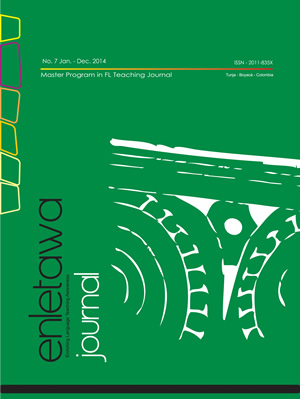“I could not cope with english, so i chose french” hearing students’ voices when they are learning a foreign language

Abstract
This paper aims at presenting the preliminary results of a research study that foregrounds the importance of taking into account the learners’ voices. This research shows the students’ experiences of a public university
when they are learning French for specific purposes, compared to their previous contact withEnglish as a foreign language. It presents a broader vision of what it means to study EFL and FFL in a public university. This papergives voice to the students themselves in order to go beyond the language itself. It also provides a reflection upon our language education practices in Boyacá. The study
revolves around the research question:What
References
- Aldera, Abdullah S. & Mohsen, M. Annotations in captioned animation:
- Effects on vocabulary learning and listening skills. Computers & Education,
- , Vol.68 pp.45.
- Basturkmen, H. (2010) “Analysing needs” in Developing Courses in English for Specific Purposes , Basturkmen, Helen, 2010 , 17-35.
- Bourke, J. 2006. Designing a topic-based syllabus for young learners. ELT Journal, 60/3, pp. 279-286.
- BritishCouncil (2003)Peacekeeping English Project publicity leaflet. London: The British Council.
- Brumfit, C. 2006 ‘What, then, MustWe Do? Or who Gets Hurt whenWe Speak,Write and Teach?’ in J. Edge (ed.): 27-48.
- Canagarajah, S. (1999) Resisting linguistic imperialism in English teaching. Oxford: Oxford University Press. Chapter 1: Adopting a critical perspective on pedagogy.
- De Mejía, A.M. (2006). Bilingual education in Colombia, towards a recognition of language, cultures and identities. ColombianApplied Linguistics Journal 8, pp 152-160. (2006)
- De Mejía, A.M. (2006). Bilingual education in Colombia, towards a recognition of language, cultures and identities. ColombianApplied Linguistics Journal 8, pp 152-160. (2006).
- Edge, J. (Ed.) (2008). (Re-) Locating TESOL in an age of empire. Basingstoke: Palgrave. England
- Freire, P. (1972). Cultural action for freedom Penguin education. Harmondsworth,: Penguin, pp. 66-72.
- Freire, P. (1998). Pedagogy of freedom: Ethics, democracy and civic courage. (Lanham, Maryland, Rowman and Littlefield). p- 54.
- González, A. Panel sesión, Bilingualism in Colombia. ASOCOPI 47TH Annual conference, Tuluá Colombia, 2012.
- Guerrero, H. (2008). Bilingual Colombia. What does it mean to be bilingual: What does it mean to be bilingual within the framework of the National Plan of Bilingualism? Profile Journal 10. Universidad Nacional de Colombia pp. 65-70. (2008)
- Kumaravadivelu B. (2001). Toward a postmethod pedagogy.TESOL Quarterly 35 (4), 537-560.
- Larsen-Freeman, D.(2012). On the roles of repetition in language teaching and learning.Applied Linguistics Review,3(2) p.192.
- Lo Bianco, J. (2005). Asian Languages in Australian Schools: Policy Options. Melbourne Asia Policy Papers, 7, May, Melbourne Institute of Asian Languages and Societies.
- Macaro, E. (2003). Teaching and Learning a Second Language: New York: Continuum.
- Ministerio de Educación Nacional [MEN]. (2006). Educación: visión 2019 [pdf]. Bogotá. Retrieved from http://goo.gl/fe7D5
- Nieto, S. (1996) Affirming Diversity: The Education, 2nd ed. (White Plains, NY: Longman).
- Steger, M.B. (2003). Globalization: A very short introduction. Oxford University Press, UK.
- Universidad Pedagógica y Tecnológica de Colombia (2009). Resolución N° 073 de 2009. In: http://www.uptc.edu.co/export/sites/defaul t/secretar ia_general /consejo_superior/acuerdos_2009/Acuerdo_073_2009.pdf
- Universidad Pedagógica y Tecnológica de Colombia 2014).Vicerrectoría Académica. Instituto Internacional de Idiomas. Programas académicos para francés e inglés, misión, visión 2014. Pp. 24-27.
Downloads
Download data is not yet available.